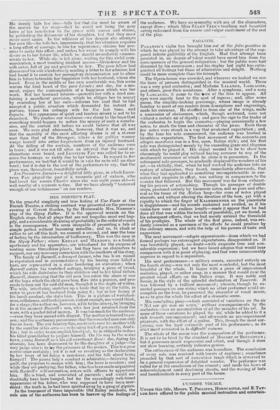PAGANINI.
PAGANINI'S violin has brought him out of the false position in which he was placed by the attempt to take advantage of the sup- posed infinite gullibility of the English. Had that attempt been persisted in, no degree of talent would have saved him from the consequences of the general indignation : but the public were half disarmed by his concession ; and his display last night has extin- guished all feelings but those of admiration and delight. Nothing could be more complete than his-triumph.
The Opera-house was crowded, and wherever we looked we saw the faces of persons distinguished in the musical world. There was a very good orchestra ; and Madame LALANDE, LABLACHE, and others, gave their assistance. After a symphony, and a song by LABLACHE, it came to the burn of the lion to appear. All eyes were eagerly bent to the spot of ingress ; and, after some pause, the singular-looking personage, whose image is already familiar to most of our readers from descriptions and engravings,. made his entrance. He shuffled in from one of the wings, made a succession of obeisances, which, though awkward, were not without a certain air of dignity ; and gave the sign to the leader of the orchestra to begin the concerto,—playing occasionally a few notes, to mark the time and character of the piece. Even these few notes were struck in a way that awakened expectation ; and, by the time his solo commenced, the audience was hushed in breathless expectation. The first movement of the concerto (an allegro maestoso) was in a fine, open, Italian style ; and his first solo was distinguished merely by the exceeding grace and elegance with which he played it. His object seemed to be to show how charmingly he could play without having recourse to any of the mechanical resources of which he alone is in possession. In the subsequent solo passages, he gradually displayed the wonders of his art,—so skilfully, that, when he had worked the audience into an ecstacy of admiration, they found, immediately afterwards, that what they had applauded as something incomprehensible in exe- cution and exquisite in effect, was nothing in comparison to the wonder that followed. But this movement was far from exhaust- ing his powers of astonishing. Though his passages of double stops, produced entirely by harmonic notes, and as pure and ethe- real as the tones of the /Eolian harp—his runs of notes played staccato, and without altering the direction of the bow, yet with a rapidity to which the finger of KALKBRENNER on the pianoforte is sluggishness—and his sounds sustained and swelled, as if his violin-bow were of endless length—made it appear that he had done all that was within the bounds of possibility, yet we found, in his subsequent efforts, that we had merely entered the threshold of his prodigies. The whole of the first piece, indeed, was evi- dently intended as a specimen of the effects he could produce by the ordinary means, and with the help of his powers of taste and expression. The next movement—adagio appassionato—from which we had formed perhaps too extravagant expectations, disappointed us. It was beautifully played, no doubt—with exquisite tone and con- siderable expression ; but we have heard adagios that would bear comparison with it in point of playing, and that were immeasurably superior in regard to composition.
His next performance—a military sonata, executed entirely on the fourth string—was not only the most wonderful, but the most beautiful of the whole. It began with a piece of impassioned recitative, played, or rather sung, in a manner that would rival the greatest vocal efforts on the Italian stage. It was noble and heroic, in the style of the splendid declamation of Tuncredi. It was followed by a brilliant movement ; wherein, though he ex- ecuted passages on one string which no other performer could ac- complish on the four, he preserved the character of vocal music, so as to give the whole the effect of a dramatic scene.
His concluding piece—which consisted of variations on the air " Nel cor phi non mi sento," without accompaniments by the orchestra—was an accumulation of all the miracles of his art. In some of these variations lie played the air; while he added to it a rich tremolo accompaniment; and afterwards an accompaniment pizzicato, with the effect of a guitar. This, though the most sur- prising, was the least estimable part of his performance, as its chief merit consisted in la difficult,: raincue.
The whole of the music was the composition of the performer.. It is not to be tried by the standard of MOZART or BEETHOVEN ; but it possesses much expression and effect, and though it does. not show learning, certainly indicates genius.
• The enthusiasm of the audience was boundless. The conclusion of every solo was received with bursts of applause ; sometimes preceded by that sort of convulsive laugh which is observed to be a general expression of delighted wonder. The performer was called for at the conclusion of the concert ; and made his bows of acknowledgment amid deafening shouts, and the waving of hats and handkerchiefs in every part of the house.


























 Previous page
Previous page